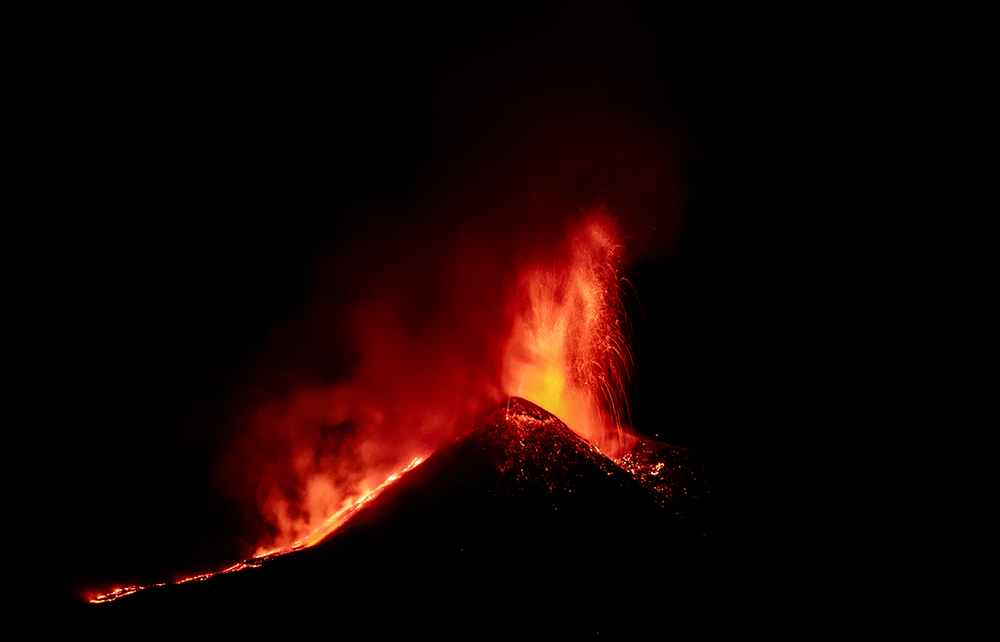Being a volcanologist demands a quiverful of skills. You need to be in command of multiple branches of science, including geophysics, geochemistry and seismology. But you must also understand people for whom science matters less than sorcery: people living near volcanoes, for whom they are sacred places, homes to ancestors, sites of miracles, mountains where God’s intervention in human affairs is made manifest in ash, fumes and flame. And you have to be brave. When it comes to studying volcanoes, risk and reward go hand in hand. So a volcanologist must be willing to peer over the edge of a crater, breathing in smoke ‘inconvenient to respiration’, crying acid tears. On Mount Erebus, Clive Oppenheimer tells us, this means looking down on a vat of molten lava throwing up red-hot bubbles the size of the cupola of St Paul’s cathedral, which distend, then pop, flinging dollops over the crater’s rim. Thudding to the ground, they look like the turds of giants.
Mount Paektu is worshipped by North and South Koreans, who invest it with hopes of eventual reunification
A professor of volcanology at Cambridge, Oppenheimer is nonchalant about what it was, 30 years ago, that drew him to this line of work. ‘I turned to volcanoes because I’d never had a better idea’, he says – as if he might just as easily have become an accountant or a traffic warden. But after a gap year spent among the volcanoes of Indonesia, he was captivated. His speciality is spectroscopy: measuring the proportion of different gases – water vapour, carbon dioxide and sulphur – in volcanic emissions. One Japanese chemist, Sadao Matsuo, has called volcanic gas ‘a telegram from the Earth’s interior’. Correctly interpreted, it can signal what a volcano might do next. Oppenheimer has also spent time investigating the possibility of taking the temperature of a volcano from space. But ‘spaceborne imagers’, he believes, ‘have a long way to go before they eclipse a trained field volcanologist huffing and puffing up and down the mountain on foot’.
So fieldwork is what he loves. He has studied more than 100 volcanoes, and he feels a kinship with them. Not only have most of them existed on Earth much longer than human beings, but our ‘fleshly inventories’ are the same – carbon, oxygen, hydrogen, nitrogen, sulphur. They are anthropomorphic. Flying over the Tibesti region of northwest Chad, he calls out, against the roar of the plane engines, the names of the volcanoes he is about to visit – Emi Koussi, Tarso Yega, Pic Toussidé – and feels ‘delirious with excitement’. He calls Erebus ‘my muse’; as he is airlifted away from it, he feels ‘the heartache of leaving a lover’.
This may sound like a private passion, but Oppenheimer’s work is profoundly altruistic. Most of us reading his book will never have been experienced worse inconvenience from a volcano than from Eyjafjallajökull in Iceland, which erupted in 2010, covering our windscreens with ash. But woven through Oppenheimer’s narrative are eye-stretching accounts of the tragedy active volcanoes can wreak on the lives of the billion or so people in the world settled within 50 miles of them. In spring 1815 Mount Tambora, on the Indonesian island of Sumbawa, erupted, and ‘liquid fire’ and a ‘violent whirlwind’ brought ‘down nearly every house in the village… tearing up by the roots the largest trees and carrying them into the air, together with men, horses, cattle’. Twelve thousand people were instantly annihilated, and over the following months many tens of thousands more died from starvation and disease. Roadsides were littered with corpses. Parents sold their children to slave traders to buy rice.
It’s Oppenheimer’s responsibility to try to predict eruptions, and so minimise catastrophe. But he is also an ambassador for volcanoes, determined to demonstrate that they mean ‘more than menace and calamity’. It won’t surprise you that heat trapped from them yields significant fractions of national supply in countries including Kenya, Iceland, the Philippines and New Zealand. But did you know that sulphur blasted by volcanoes into the stratosphere plays a vital part in cooling the planet? And they can help promote political harmony. Oppenheimer devotes one gripping chapter to his work on Mount Paektu, worshipped by North and South Koreans, both of whom invest it with hopes of eventual reunification.
Just occasionally he allows us to glimpse him back in the library in Cambridge, seeking out volcanoes in Pliny’s Natural History or the medieval Chronicon Scotorum. But any reader in doubt about the depth of academic research that has gone into Mountains of Fire needs simply to turn to his notes and references: nearly 100 pages of them. Wisely, he has consigned them to the end of the book. Not a single footnote clutters the main text or distracts from what reads, very often, like a thriller. Perhaps one final attribute of a volcanologist is that he should be a good storyteller. Oppenheimer is better than good. This is terrific.






Comments